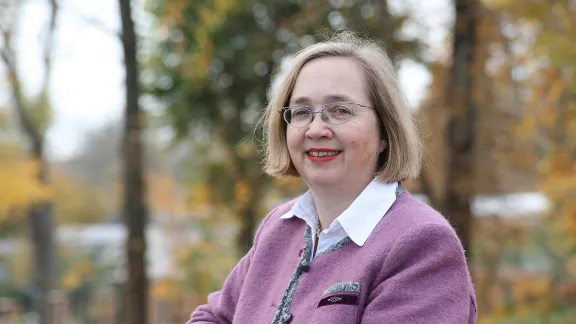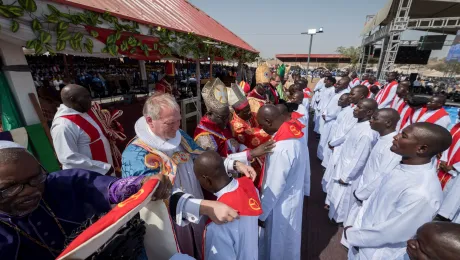
Rev. Inken Wöhlbrand has been director of the LWF Center Wittenberg since October 2018. Photo: LWF/Weyermüller
Interview with Rev. Inken Wöhlbrand, director of the LWF Center Wittenberg
(LWI) – The Lutheran World Federation (LWF) Center in Wittenberg, Germany, makes the LWF present in this historical city and offers programs that connect Lutherans with each other and with other Christians around the world. Rev. Inken Wöhlbrand, the new director of the LWF center, spoke to Lutheran World Information about the center’s work, the potential of ecumenical and international encounters, and how the Luther Garden has woven a worldwide network.
What has been your experience in your first 100 days as the new director of the LWF Center Wittenberg?
I was welcomed very warmly. Rev. Hans Kasch, my predecessor since the LWF Center Wittenberg was founded in 2009, had laid a very good foundation. For example, I found good connections with the host church – the Evangelical Church in Central Germany – and the city of Wittenberg. Being able to pick up the threads makes things very easy.
It so happens that I was fortunate enough to be able to share in the founding phase of the LWF Center Wittenberg in the context of my former job with the German National Committee of the LWF (GNC/LWF) and the United Evangelical Lutheran Church of Germany (VELKD). Meanwhile the LWF Center Wittenberg is firmly established so that we can enter into the next phase. On the one hand, I stand for continuity. On the other, I am a different person from Hans Kasch, with a different background and biography, which also brings new accents. Moreover, individuals always mold their office – that is no different in this case.
One of the core commitments of the LWF Center Wittenberg are theological seminars for pastors, which attract participants from the different LWF regions. What conclusions do you draw from the 18 two-week seminars held there since the inception of the center?
The focus on Luther’s theology has basically proven itself. In addition, there is an opportunity to study this material with other participants from very different countries and contexts. That is what makes these seminars special. It is striking that we Lutherans attach great value to intensive theological training: almost all our participants have covered a lot of ground on their way to pastoral ministry, with several years of university study and other phases of training.
For the future, I think that our seminars can offer more scope for linking the Reformation history with relevant issues of today. For this we will need speakers and lecturers with strong communicational and language skills as well as experience in holding seminars with international groups.
The last tree plantings in the park known as Luther Garden took place close to Reformation Day in 2018. What is going to happen with this living monument of the Reformation?
The Luther Garden is a public space for the church and the city of Wittenberg community. And it is growing in two respects: content and design.
In terms of content, I see the Luther Garden as a place that can become a spiritual center and where people from all cultures and beliefs can express their conviviality in a special way. Every one of the 500 trees planted there connects us, in Wittenberg, with another place in the world and with another church. Now, with visitors arriving from everywhere and with participants at our seminars, we have to take up this connection or create new ones. For example, I can imagine trying out different forms of spirituality in our groups and creating a meditation path with different stations in the Luthergarten. I would also like to find new, inviting forms for members of other religions or none.
In terms of design, the garden is growing with the addition of new objects. The Luther Garden flows into the urban area and thus some art projects have already found a place in it. We can certainly develop more good ideas in creative cooperation with partners from the Wittenberg context.
It is my wish that Lutherans all over the world will know and feel that they have a “home far away from home” in Wittenberg. And I would like the network of trees in the Luther Garden to represent a web of people extending far beyond the Lutheran family.
And things have started happening. For example, there is cooperation between a school and the Luthergarten. The students make jam from fruit they collect from the trees and then sell it . This project is very successful - many visitors glad to take home a jar of jam as a souvenir.
What is your vision for the LWF Center ten years from now?
It is my wish that Lutherans all over the world will know and feel that they have a “home far from home” in Wittenberg. And I would like the network of trees in the Luther Garden to represent a web of people extending far beyond the Lutheran family. I hope and pray that our theological work and our spiritual journey with people from all over the world will contribute to our living in peace and mutual esteem. That is not something we can take for granted, as we see in Germany at present and hear from the way our visitors describe their everyday experiences all over the world. It is worth standing up for, even as a minority in society – which we Christians are in Wittenberg and elsewhere.
LWF Center Wittenberg
Since its inception in 2009 the LWF Center Wittenberg ensures the presence of the Lutheran World Federation (LWF) in the historic town of the Reformation in Germany. It serves as a point of contact of the member churches of the LWF, organizes various seminars, bears responsibility for the Luthergarten and assists visiting groups from all over the world. Rev. Inken Wöhlbrand is the director of the LWF Center Wittenberg.


